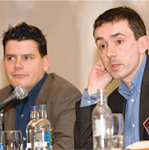Search becomes intensive |
 |
| Ailing McMahon reports from a major international search marketing seminar |
Irish internet users are increasingly
turning to search engines to find information as their first point of call with
this number rising by 35 per cent over the past year, industry figures indicate.
An online survey of 500 users showed that 83 per cent of respondents said they
search every day and 52 per cent several times daily.
Google is the natural search engine of
choice for 96 per cent of the respondents. Yahoo! was in second position with 24 per cent
and MSN third with ten per cent. These
were some of the facts and figures presented by Amarach Research at the second annual
Search Marketing World 2008 Conference held in Dublin recently.
Video and mobile search are the emerging
opportunities. This is good news for the
Irish market which has a high mobile penetration, but the implementation of
mobile sites is poor and needs to be addressed to meet the demand.
A number of international speakers and practitioners
from the search marketing industry took centre stage to discuss topics such as online
PR, social media, blogs and spoke about how to integrate search into media plans.
Vanessa Fox of Search Engine
Land strongly agreed that
the new online medium was not a fad. Although it is hard to quantify the direct
commercial return for this medium, Fox maintains it can be used to direct
traffic to a site and raise awareness.
Social
media sites such as Facebook and Bebo are changing the search marketing landscape
and raising tough questions for marketers.
How can they achieve and quantify visibility, brand building and lead generation
through this online medium?
Social media is anywhere people are
communicating and interacting online from niche forums, social media submission
sites such as DIgg or Technorati, reviews and rating sites such as Amazon and the
various online blogging sites.
It was pointed out that participating in
this medium can be effective but the real trick is to understand it and be
authentic. There are plenty of examples where brands have pursued this medium
only to have being uncovered as fakes.
WalMart was running a fake blog about an
average American couple travelling across the country in a van spending each
night in a WalMart parking lot. Edelman
was behind the fake blog or ‘flog' but the net effect was bad PR for all
concerned.
The real power behind social media is the
notion of the ‘wisdom of the crowd'. Your product or service is out there and
will be rated regardless. If you participate and add value, you can contribute
and be more in control of this medium.
Another argument for ratings and reviews of
your product is that negative comments can add value too as it will make the
commentary appear more objective, rather than have issue a fawning assessment
few people believe.
Representatives from adland are optimistic
about the opportunities provided by search marketing. There is a race for advertising
agencies and media buying agencies to demonstrate how to provide search
marketing for its clients.
Figures from the Internet Advertising
Bureau in the UK, showed
that online advertising spend in Europe was up
from €8 billion in 2006 to €11.5bn last year, an increase of 38 per cent.
Growth is forecast in web TV, mobile internet and social media.
It was proven that there is a direct
relationship between TV campaigns and search.
Neil McCarthy from the Latitude Group said TV campaigns had a direct
effect on search activity and discussed the need for online marketing to become
strategic.
A study by US agency iProspect shows that 67
per cent of online searches are influenced by some form of offline marketing –
39 per cent by TV and 30 per cent by print. Some 39 per cent of these searchers
are prompted to make a purchase.
 |
SEARCH EXPERTSMel Carson, adCenter Europe and Peter Cobley, Yahoo! UK & Ireland, at the second annual Search marketing World Conference held in Dublin recently. |
Social sites like Bebo and Facebook are the
new search marketing battleground, conference organiser Martin
Murray of Interactive Return said. Amarach Research reported that 60 per cent
of respondents have a social networking site.
Alan Cox, Publicis Groupe Media, said search is bolted on to existing
activities or used in complete isolation from marketing programmes. He said
search is almost a parallel industry which has not been fully embraced by the
traditional agencies.
Search marketing is one of the more accountable
parts of the business. Many of the
search engines are providing free toolsets to allow marketers track results for
their search campaigns and mobile and video search are gaining momentum.
The effect of user generated content on
search engine rankings was also discussed at length with social media and
blogging sites having a direct impact on search results. Overall, there is a need for search to become
more transparent.
Customers need to understand the options
for search marketing and those which suit their needs; display advertising or
search advertising. Indexing your site within a search engine can be done by organic
listings or pay per click inclusion.
Within search marketing, there should be a
medium to suit each customer. But delegates were told that the trick is to
fully understand the options and leverage them in the best possible way which
integrates with the marketing strategy.









